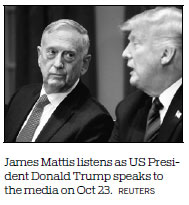US allies rattled after Mattis resigns
Pentagon chief quits after disagreements with Trump on pulling troops from Syria
The abrupt resignation of US Defense Secretary Jim Mattis sparked concern among Asia-Pacific allies who credit the retired general with building trust and tempering isolationist impulses, regional officials and analysts said on Friday.
The region - which includes US allies Japan, the Republic of Korea and Australia - hosts some of the world's most volatile flashpoints.
Mattis will "be retiring, with distinction", after having served the government as the defense chief for the past two years, US President Donald Trump said on social media.

"During Jim's tenure, tremendous progress has been made, especially with respect to the purchase of new fighting equipment," the president said on social media.
He added that a new defense secretary "will be named shortly".
There have been rumors for a long time that the relationship between Trump and Mattis wasn't smooth, but the president didn't mention his disputes with Mattis or whether Mattis was forced to resign.
However, in a resignation letter to Trump dated on Thursday, Mattis wrote: "Because you have a right to have a Secretary of Defense whose views are better aligned with yours" on many subjects, "I believe it is right for me to step down from my position".
In the letter, the 68-year-old former Marine Corps general implicitly criticized Trump for his treatment of US allies.
"One core belief I have always held is that our strength as a nation is inextricably linked to the strength of our unique and comprehensive system of alliances and partnerships," Mattis wrote.
Mattis, who embraced the United States' traditional alliances, said he was quitting after falling out with US President Donald Trump over foreign policy, including surprise decisions this week to pull troops from Syria and start planning a drawdown in Afghanistan.
Mattis has worked to ensure tensions in the region did not boil over, analysts said.
Foreign policy and security analyst Euan Graham, the executive director of La Trobe Asia at Australia's La Trobe University, said: "He's been the point of continuity and the gatekeeper in the administration that they've relied on most to temper the instincts of Trump, which are much more, I think, isolationist and clearly highly sceptical... about alliance commitments."
Mattis' departure also robs Australia, without a US ambassador since 2016, of a key ally in the Trump government.
"Australia has always had the ear of Mattis," a US-based diplomatic source told Reuters.
Australia has had roughly 800 troops in the Middle East since 2014, mostly based in Iraq, as part of coalition efforts to combat the Islamic State terror group.
About 300 troops are based in Afghanistan, where they have had a presence since not long after the war began 17 years ago.
Trump announced on Wednesday that US troops in Syria would be withdrawn, a decision that upended US policy in the region.
A US official said on Thursday that Trump was planning to withdraw at least 5,000 of the 14,000 US troops in Afghanistan. Mattis had advocated a strong US military presence to bolster diplomatic peace efforts there.
Adam Mount, defense analyst at the Federation of American Scientists, said Mattis was a steady hand on the Democratic People's Republic of Korea and was instrumental in preventing a new war on the peninsula.
"His work kept the alliance afloat but major questions will have to be resolved to keep it strong," he said.
Reuters, Xinhua and AP contributed to this story.
(China Daily 12/22/2018 page8)














